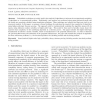7 search results - page 1 / 2 » Forcing with Random Variables and Proof Complexity |
CIE
2006
Springer
13 years 8 months ago
2006
Springer
or representation theory of groups), and even borrows abstract geometrical concepts like Euler characteristic or Grothendieck ring. However, the most stimulating for proof complexi...
APPROX
2010
Springer
13 years 6 months ago
2010
Springer
We give a simple combinatorial proof of the Chernoff-Hoeffding concentration bound [Che52, Hoe63], which says that the sum of independent {0, 1}-valued random variables is highly ...
JCST
2010
12 years 11 months ago
2010
Probabilistic techniques are widely used in the analysis of algorithms to estimate the computational complexity of algorithms or a computational problem. Traditionally, such analys...
POPL
2003
ACM
14 years 4 months ago
2003
ACM
We present a new polynomial-time randomized algorithm for discovering affine equalities involving variables in a program. The key idea of the algorithm is to execute a code fragme...
SIAMCOMP
2002
13 years 4 months ago
2002
We consider several problems related to the use of resolution-based methods for determining whether a given boolean formula in conjunctive normal form is satisfiable. First, build...

